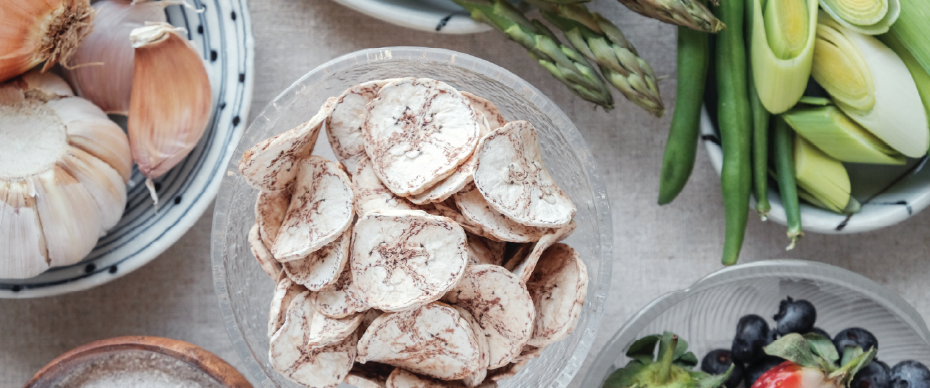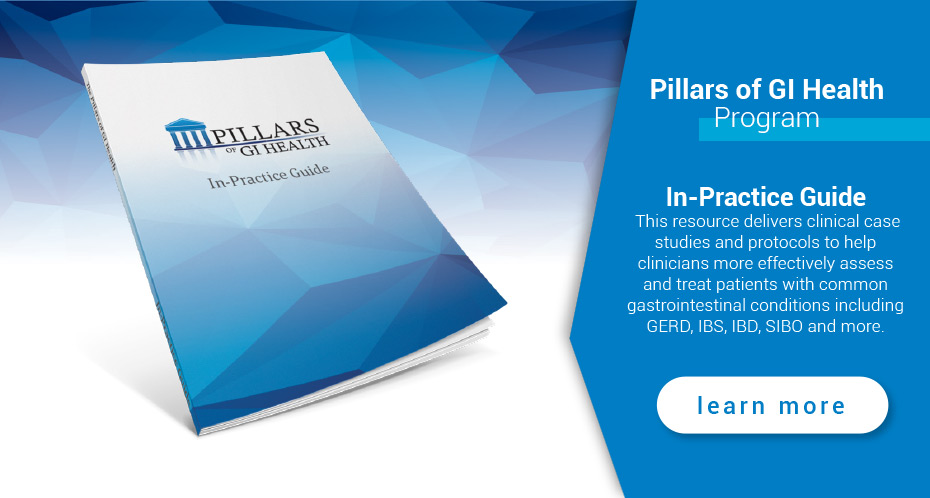When you think of a prebiotic, you probably think of resistant starches or indigestible fibers like inulin, tapioca starch and arabinogalactans, to name a few. However, if you’ve ever had patients experiment with these types of fibers, the one problem they probably reported (or perhaps called you in the middle of the night about) is gas and bloating. Too much fiber too quickly can lead to a really uncomfortable belly. And if there’s underlying SIBO, supplemental fiber is a big “no-no.”
But there is another type of prebiotic nutrient that doesn’t cause uncomfortable gas and bloating, unlike traditional fiber. Research is showing it can have tremendously beneficial effects on the gut microbiome, mucous layer and gut lining. This new prebiotic supplement is based on polyphenols.
What Are Prebiotics?
Prebiotics are nutrients that induce the growth or activity of beneficial bacteria in the gut. They are found in a variety of foods, including Jerusalem artichoke, asparagus, green bananas, wheat bran, garlic, scallions and blueberries. The fibers in these foods are difficult to digest, so they instead make it intact to the distal small bowel and large intestine, where they induce microbial fermentation. Beneficial microbes use prebiotics to create other beneficial postbiotic nutrients, like short-chain fatty acids (SCFA).
Prebiotic fiber is found in many supplements. You can purchase them individually as either a powder or capsule, and they are also available as part of a “symbiotic” formula, which combines prebiotics with probiotic bacteria. However, too much of a good thing can lead to uncomfortable side effects, including gas, bloating, diarrhea or constipation. Some patients will tolerate certain types of fibers better than others. And too much fiber too quickly without increasing hydration can lead to painful constipation.
Prebiotics and SIBO
SIBO (small intestinal bacterial overgrowth) results from a high concentration or “overgrowth” of bacteria in the small intestine, where the maximum bacterial concentration should not exceed 105 per ml. SIBO can be the consequence of either an overgrowth of small bowel commensal organisms or the transmigration of bacteria from the colon across the ileocecal valve. Up to 60% of patients with irritable bowel syndrome (IBS) may also have underlying SIBO.
In the case of patients with SIBO, traditional fiber-based supplements are not ideal. Any extra fiber will inevitably worsen their SIBO symptoms because fiber produces gas during the fermentation process. Patients with SIBO are inevitably left with few choices to rebalance their gut microbiome, heal their leaky gut and relieve their symptoms. That’s where polyphenol-based prebiotic supplements come into the picture.
What Are Polyphenols?
Polyphenols are natural compounds in fruits, vegetables, grains, herbs and spices that act as antioxidants. They’re also found in tea, dark chocolate and wine. Just like fiber, polyphenols are minimally absorbed. So, instead of getting into the body with other nutrients in the upper to mid-small bowel, they make their way to the distal small intestine and large intestine, where bacteria utilize them for food.
Polyphenol-based prebiotics are non-fiber prebiotics that provide essential nutrients to maintain the mucous border, improve the gut lining and rebalance the gut microbiome while producing little to no gas.
Aside from their antioxidant activity, they can also help balance blood sugar, improve digestion and support healthy brain function. In terms of gut health, polyphenols help with three things: 1) they support the growth of healthy commensal bacteria to crowd out pathogenic bacteria, 2) contribute to a healthy mucous layer by linking together to form a matrix, and 3) help improve the integrity of the gut lining.
Polyphenols and Prebiotics
The research has specifically looked at two types of polyphenols as prebiotics:
- Pomegranate fruit extract
- Citrus flavanones
Pomegranate fruit (POM) extract contains the polyphenols ellagic acid and punicalagins. These polyphenols are metabolized by the microbes in the small intestine to produce secondary metabolites (postbiotics) known as urolithins. One study found that “POM extract may impact weight maintenance and insulin resistance by changing the ratio of Firmicutes to Bacteroidetes and increasing Akkermansia in the gut microflora.”1
Citrus flavanones (CF) are metabolized by intestinal bacteria, mainly in the proximal colon, forming small phenolics known as their aglycones, hesperetin and naringenin. According to a review of the current evidence, “studies have also shown that citrus flavanones and their metabolites are able to influence the microbiota composition and activity and exert beneficial effects on intestinal barrier function and gastrointestinal inflammation.”2 From in vitro evidence, this review showed that 500 mg CF given twice a day over a three-week period significantly increased SCFA levels by promoting the growth of bacterial groups known to produce butyrate.
Polyphenol-Based Prebiotics Treatment Example
I recently had a 55-year-old male present with sudden onset of chronic diarrhea. He had been living with it for several months before he came in to see me about it. A Gut Zoomer Test showed loss of bacterial diversity, elevated markers of inflammation, low butyrate and low Akkermansia muciniphila, but no signs of gut pathogens. Based on his stool analysis, I decided to put him on a polyphenol-based prebiotic.
In his first follow-up visit, he shared, “With the prebiotic, things got even better within a couple of days.” He was still taking it at the time of the follow-up visit, and he felt his gut issue had completely resolved at that point.
The Bottom Line
Polyphenol-based prebiotics open the door to a whole new class of natural remedies for gut issues that may respond poorly to traditional fiber-based prebiotics. In addition, the research is showing that polyphenols have favorable effects on the gut flora, gut lining and the mucin layer that protects the gut lining. For all these reasons, polyphenol-based prebiotics have the potential to become the new, favored prebiotic for GI cases.

Dr. Vincent Pedre is the Medical Director of Pedre Integrative Health and Founder of Dr. Pedre Wellness, nutraceutical consultant and spokesperson for NatureMD, CEO of Happy Gut Life LLC, and a Functional Medicine-Certified Practitioner with a concierge practice in New York City since 2004. He believes the gut is the gateway to excellent wellness. He is also certified in yoga and medical acupuncture. As Spanish-speaking faculty for The Institute for Functional Medicine, Dr. Pedre has taught the AFMCP in Spanish in Lima, Peru, as well as an introduction to functional medicine in Mexico City. As the bestselling author of “HAPPY GUT®—The Cleansing Program To Help You Lose Weight, Gain Energy and Eliminate Pain,” featuring his proprietary ‘blueprint’ for healing the gut, the Gut C.A.R.E.® Program—he has helped thousands around the world resolve their gut-related health issues.
References
1. Bialonska D, Ramnani P, Kasimsetty SG, Muntha KR, Gibson GR, Ferreira D. The influence of pomegranate by-product and punicalagins on selected groups of human intestinal microbiota. Int J Food Microbiol. 2010 Jun 15;140(2-3):175-82. doi:
10.1016/j.ijfoodmicro.2010.03.038. Epub 2010 Apr 2. PMID: 20452076.
2. Stevens Y, Rymenant EV, Grootaert C, Camp JV, Possemiers S, Masclee A, Jonkers D. The Intestinal Fate of Citrus Flavanones and Their Effects on Gastrointestinal Health. Nutrients. 2019 Jun 27;11(7):1464. doi: 10.3390/nu11071464. PMID: 31252646; PMCID: PMC6683056.




